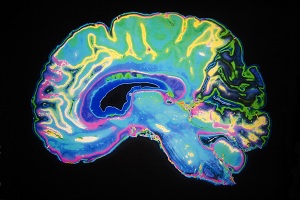Amnesia
 Amnesia is the loss of memory, which may be partial or complete, and may be permanent or temporary. It is typically caused by illness, brain disturbances, trauma to the head, or psychological trauma.
Amnesia is the loss of memory, which may be partial or complete, and may be permanent or temporary. It is typically caused by illness, brain disturbances, trauma to the head, or psychological trauma.
Types of Amnesia
Anteretrograde amnesia is the retention of previously learned information but the inability to learn new information. For example, a person may remember their life history, schooling, and how to play the piano, but may be unable to remember new people, new concepts, or new life events.
Retrograde amnesia is the inability to remember previous events. Retrograde amnesia does not typically affect the ability to remember previously learned facts and skills. For example, a person might not remember their identity or biographical information but will likely retain the ability to read.
Amnesia typically affects either procedural memory or declarative memory. Procedural memory is the ability to remember complex procedures such as reading or playing the piano while declarative memory is the ability to recall facts and autobiographical information. However, the effects of amnesia vary greatly from person to person, and amnesiacs may suffer from a combination of anteretrograde and retrograde amnesia and may exhibit a few symptoms of both varieties. People may also experience partial disturbances in both procedural and declarative memory, though the complete loss of both forms of memory is exceedingly rare. Some people experience temporary, transient bouts of amnesia.
What Causes Amnesia?
Drugs and alcohol can cause temporary amnesia, and substance abuse may cause brain damage leading to long-term amnesia. Other brain problems caused by injury, disease, or medication can also cause amnesia. Electro-convulsive therapy may cause difficulty with short-term memory as well as temporary retrograde amnesia. Posttraumatic stress is frequently associated with amnesia for specific events. Similarly, a dissociative fugue occurs as a reaction to a traumatic event, and results in temporary amnesia.
Childhood amnesia is a well documented form of amnesia. Most people cannot remember significant portions of early childhood, and few people can recall anything prior to the age of two or three. The controversial concept of repressed memories is one of the most popularly studied forms of amnesia, in which a person cannot remember a traumatic part of their earlier life. There have been numerous psychological scandals involving the manufacture of fake repressed memories. While memories can indeed be repressed, there is no known reliable technique to uncover such memories that does not pose a risk of manufacturing false memories.
References:
- American Psychological Association. APA concise dictionary of psychology. Washington, DC: American Psychological Association, 2009. Print.
- Colman, A. M. (2006). Oxford dictionary of psychology. New York, NY: Oxford University Press.
- Harwood, R., Miller, S. A., & Vasta, R. (2008). Child psychology: Development in a changing society. Hoboken, NJ: John Wiley & Sons.
Last Updated: 08-4-2015
Leave a Comment
By commenting you acknowledge acceptance of GoodTherapy.org's Terms and Conditions of Use.
